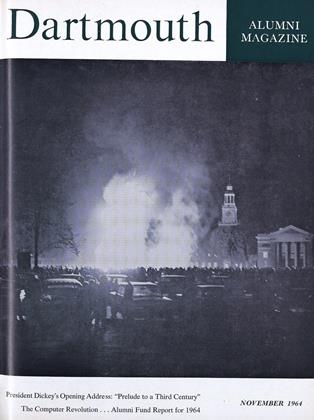HAPPENINGS in the first month of the College's 196th year produced a sharp miniature of the full landscape of a Dartmouth year. Sadness and sympathy, jubilation and disappointment, reflection and commitment, initiative and invention, and youthful vigilance for the wry and the why were all duly recorded in black on dull white of the undergraduate daily journal.
The sense of loss brought upon the campus by the passing of President Emeritus Ernest Martin Hopkins '01, and poignantly put into words by President Dickey in a memorial included within the traditional Convocation proceedings, was heightened further by the news that an active and outstanding member of the senior class, Robert O. Beadel Jr. '65, had died of malaria overseas. He had been helping to build a grade school in Mpeseduaze, Ghana, this summer as part of the Operations Crossroads Africa program of service. Classmates, co-workers on the Crossroads Africa project, and other friends honored this son of Robert O. Beadel '29 of Syracuse, N. Y., by establishing a scholarship fund in his name.
The College community again joined in the sadness of a memorial service less than two weeks later when two young lives were tragically ended in an automobile crash near Brattleboro, Vt. The victims were James B. Wilhelm '63, of Cleveland, who had senior class standing, and Eric J. Morgenthal '68 of Newton, Mass., a member of Dartmouth's newest class. Wilhelm was the son of John W. Wilhelm '38 and the brother of John W. Wilhelm Jr. '61. Three other students were injured in the one-car early morning accident.
Compared to the loss in human potential in these young lives, the gains and setbacks of the weeks to follow in the life of the College were transitory. The rich sense of fellowship grew with 1968's mammoth bonfire into the oak green warmth of one of the finest of Dartmouth Nights, and although the enthusiastic spirit engendered was stunned momentarily under a Black and Orange onslaught, it survived disappointment and returned stronger than ever to stimulate a hard-won victory over Brown - and was sweetened by the TV camera view of proceedings in a certain Massachusetts stadium.
There was also a triumph too easily won in the center of campus when the Class of 1968 gained the right to discard beanies with an overwhelming show of strength in the traditional rope pull. The contest was so one-sided, especially compared to last year when upperclassmen carried the day, that the victors surrendered the rope without protest and in a matter of minutes the touch football contestants had the green to themselves again.
There were others who took greater chances for something more than personal and campus honors. Seven students journeyed to Mississippi in an effort organized by the Dartmouth Christian Union's political action committee to assist in the civil rights movement there. One soon found himself arrested for "passing out handbills without a permit."
On campus others were acting out of conscience. Tau Epsilon Phi fraternity voted to abolish the use of the blackball during rush, the third house to do so since last spring. Other houses taking action were Delta Upsilon, which now finds itself in a debate on "going local" because of inaction by the fraternity's national trustees on this issue, and Alpha Chi Alpha.
On the inventive side, the students in the Choate Road dorms cleverly set the College's new computer to playing cupid in selectively matching 138 "blind dates" with young ladies from Boston University's Tower Hall dormitory. Preference questionnaires were filled out on both sides and data supplied to the computer. The results? The computer did just fine but human beings are just as unpredictable and hard to satisfy as ever. Residents of Cutter and North dormitories initiated new programs based on the "diversity principle" and suggested by the students themselves. One of the first, a panel discussion on the United Nations featuring President Dickey, Provost John Masland, Librarian of the College Richard W. Morin '24, and Prof. James Barros, was a well-received kickoff.
As for the student why and the wry, both were more often than not in the question form. Why was that truckload of hay backed up to Thayer Hall? Are students eating differently these days? Why not a spokesman for the conservatives on the GI program? And when one was added, why not Milton Friedman rather than Ralph de Toledano? And why was the B & G man watering, the lawn during a downpour? And why wasn't the definition of "lewdness,", specified as a violation of College standards in the new Student Handbook, spelled out? Asking questions, The Dartmouth editors have learned in one short month, can be lots of fun.
 View Full Issue
View Full Issue
More From This Issue
-
 Feature
FeaturePrelude to a Third Century
November 1964 -
 Feature
FeatureTHE COMPUTER REVOLUTION
November 1964 By GEORGE O'CONNELL -
 Feature
FeatureThe Darthmouth Alumni Fund REPORT 1963-1964 1915 Golden Anniversary 1964
November 1964 -
 Feature
FeatureREPORT CARD
November 1964 -
 Feature
FeatureOnward and Upward with '68
November 1964 -
 Article
ArticleTHE UNDERGRADUATE CHAIR
November 1964 By BOB WILDAU '65
Article
-
 Article
ArticleLabor Union on Campus.
OCTOBER 1966 -
 Article
ArticleClub Calendar
November 1980 -
 Article
ArticleTuck School
FEBRUARY 1966 By BILL BARNET T'65 -
 Article
ArticleNotebook
July/Aug 2002 By JOE MEHLING '69 -
 Article
ArticleIn Batman's Camp.
FEBRUARY 1966 By R.J.B. -
 Article
ArticleTHE RECENT GROWTH OF DARTMOUTH A PARTIAL RECOVERY OF POSITION
December, 1911 By William Jewett Tucker, '61

